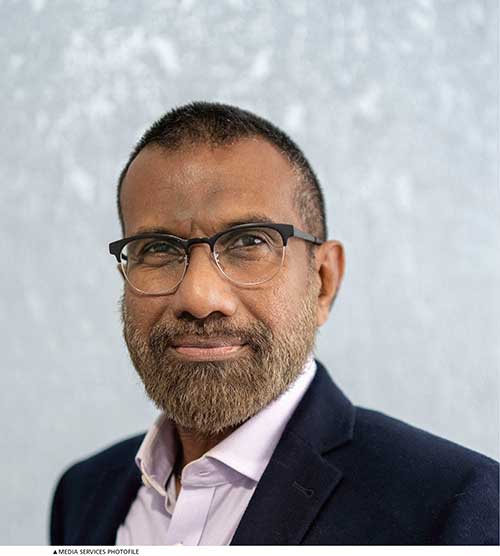Hisham Fawzy
Financial reporting standards
My Sri Lankan heritage has profoundly shaped my approach to an international career in several meaningful ways

Q: How has your experience of living and working in different countries like Sri Lanka, the Maldives and the UK shaped your professional outlook?
A: Embarking on a career as a chartered accountant in Sri Lanka, and relocating to the Maldives and UK thereafter, has been an enriching journey – one that has greatly influenced my outlook.
Living and working in different countries, one needs to learn the importance of cultural adaptability and resilience in navigating complex sociopolitical landscapes, which is one of the key factors of a successful career.
I commenced my career in the Maldives at a time when I experienced several resource constraints, particularly in relation to my profession. The unique challenges consequently honed my problem solving skills while steering me towards my objectives with limited resources.
My experience in the UK further refined my professional ethos, emphasising efficiency, professionalism and the value of structured processes. The diverse and inclusive work environment taught me to manage cross-cultural teams and implement practices that foster inclusivity.
Together, these experiences have given me a global perspective, enhancing my ability to adapt to different work environments and understand diverse cultural dynamics. They have made me more open-minded and culturally aware, and prepared me to tackle challenges with a broader outlook.
Q: During your tenure as an auditor, what were the key challenges?
A: I arrived in the Maldives when there wasn’t a statutory requirement to prepare financial statements. The absence of a professional accountancy body meant that the accounting standards adopted in the Maldives were inconsistent and largely undefined.
However, with the growing presence of multinational companies and introduction of statutory requirements to prepare financial statements in line with International Financial Reporting Standards (IFRS), I encountered the challenge of transitioning to a new set of standards from a baseline of virtually nothing.
This required not only a deep understanding of IFRS but also considerable efforts to educate clients and convert existing policies to align with these newly adopted standards.
Fortunately, my experience with Sri Lankan accounting standards, which converged with IFRS, provided a strong technical foundation. But given the rapid evolution of IFRS during this period, it was crucial to stay abreast of the latest developments.
Being attached to EY was a significant advantage as the firm’s commitment to upskilling members ensured that I had the necessary support and resources to navigate these changes effectively.
This experience not only enhanced my technical expertise but also reinforced the importance of continuous learning and adaptation in a dynamic regulatory environment.
Q: How do you see the future of IFRS evolving – especially in the context of the Asia-Pacific region?
A: IFRS by its nature is designed to be global rather than region specific. With the dynamic growth and development of certain economies in the Asia-Pacific region however, these markets are likely to influence the evolution of these standards.
One of the key trends I foresee is the continued harmonisation of accounting standards across the Asia-Pacific region. Many countries in the region either adopted IFRS or are converging their local standards with it, driven by the need for greater transparency, comparability and trust in financial reporting.
This is imperative to facilitate cross-border investments and trade, which are crucial for the region’s growth.
I also anticipate that IFRS will continue to evolve to address emerging global trends like sustainability reporting, digital transformation and the increasing complexity of financial instruments.
The continuous emphasis on environmental, social and governance (ESG) factors is one such instance that will influence standard setters. This is particularly relevant in the Asia-Pacific region where stakeholders are increasingly focussed on sustainable development and responsible investment.
Furthermore, as technology including digital tools continues to reshape the way financial information is processed, analysed and reported, IFRS will need to adapt to these changes. Accordingly, the evolution of this standard in the region will be driven by a combination of global trends and regional nuances.
Q: What aspects of your Sri Lankan heritage have you found to be most beneficial in your international career?
A: My Sri Lankan heritage has profoundly shaped my approach to an international career in several meaningful ways.
Key among these are the values of integrity and ethical behaviour instilled by the Institute of Chartered Accountants of Sri Lanka (CA Sri Lanka); the ability to adapt and respect inclusivity through my education in a school and life in a country shaped by a multicultural society; and the resilience developed from growing up in a nation that has experienced major social and economic changes.
These values along with others that I’ve inherited have equipped me with the tools to navigate global challenges while staying true to my principles.

CV IN A NUTSHELL
Hisham Fawzy is an accountancy professional with over 40 years of global experience in both professional practice and commerce.
Fawzy has held leadership roles at EY where he was instrumental in building one of the largest accountancy firms in the Maldives in collaboration with the practice in Sri Lanka. He is skilled in compliance, financial reporting and team management, and has served a diverse clientele across multiple industries.
He has also worked with the Maldives Ports, funded by the Asian Development Bank (ADB), to introduce a suitable accounting and management information system.
Fawzy holds an MBA from the National University of Singapore (NUS) and various professional accounting qualifications – and he counts extensive training in International Financial Reporting Standards (IFRS), auditing and leadership.
FACT FILE
FAMILY
Married with four children
SCHOOLING
Royal College
HIGHER EDUCATION
National University of Singapore (NUS)
PRESENT OCCUPATION
Practising accountant
COUNTRY OF RESIDENCE
UK
CITY OF RESIDENCE
Birmingham
